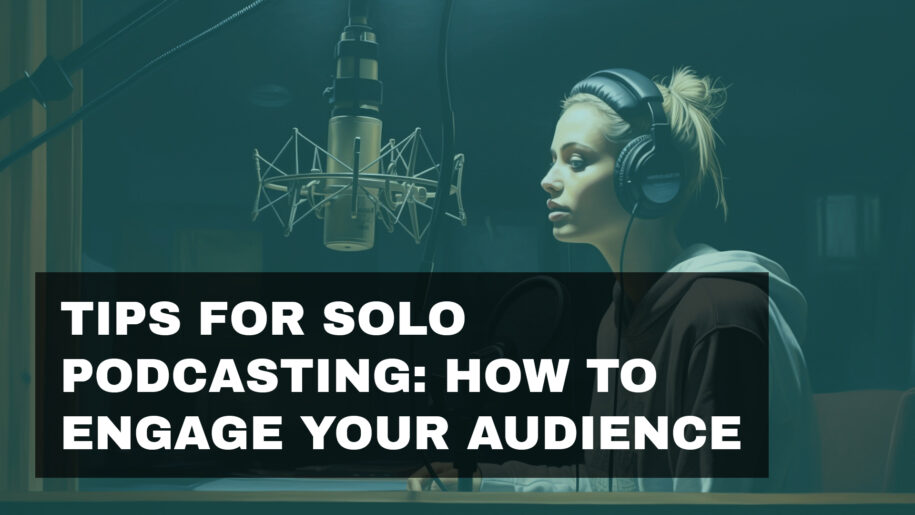Solo podcasting can be a rewarding experience, offering complete creative control and the opportunity to share your unique perspective. However, engaging your audience without the dynamic of a co-host or guest can be challenging. In this blog post, we’ll explore effective strategies for solo podcasters to captivate and engage their audience.
Why Engagement Matters in Solo Podcasting
Engagement is crucial for building a loyal listener base. When you effectively engage your audience, you foster a sense of community and encourage listeners to return for future episodes. For solo podcasters, mastering the art of engagement can set your podcast apart and drive its success.
Tips for Engaging Your Audience as a Solo Podcaster
1. Develop a Strong Personal Brand
- What It Is: Establishing a clear and consistent identity that reflects your personality and podcast’s theme.
- Why It Matters: A strong personal brand helps listeners connect with you on a personal level, fostering loyalty and trust.
- Tips: Define your podcast’s niche, style, and voice. Be authentic and let your personality shine through your episodes.
2. Use Storytelling Techniques
- What It Is: Incorporating storytelling elements to make your content more compelling and relatable.
- Why It Matters: Stories captivate listeners and make your content more memorable.
- Tips: Share personal anecdotes, case studies, or listener stories. Structure your episodes with a clear beginning, middle, and end.
3. Engage with Your Audience Directly
- What It Is: Creating opportunities for interaction with your listeners.
- Why It Matters: Direct engagement makes listeners feel valued and part of your podcast community.
- Tips: Encourage listener feedback, answer questions, and acknowledge listener comments and reviews in your episodes.
4. Provide Value in Every Episode
- What It Is: Ensuring each episode offers something beneficial to your listeners.
- Why It Matters: Valuable content keeps listeners coming back and can drive word-of-mouth promotion.
- Tips: Focus on educational, entertaining, or inspirational content. Deliver actionable insights and practical tips.
5. Maintain a Consistent Schedule
- What It Is: Releasing episodes on a regular, predictable schedule.
- Why It Matters: Consistency helps build anticipation and trust with your audience.
- Tips: Choose a schedule that you can realistically maintain, whether it’s weekly, bi-weekly, or monthly, and stick to it.
6. Use High-Quality Audio
- What It Is: Ensuring your podcast’s audio quality is professional and clear.
- Why It Matters: Good audio quality enhances listener experience and keeps them engaged.
- Tips: Invest in a good microphone, use soundproofing techniques, and edit your episodes to remove background noise and ensure clarity.
7. Create Compelling Episode Titles and Descriptions
- What It Is: Crafting intriguing titles and informative descriptions for your episodes.
- Why It Matters: Compelling titles and descriptions attract new listeners and help with search engine optimization (SEO).
- Tips: Use relevant keywords, keep titles concise and descriptive, and write engaging descriptions that summarize the episode’s content and benefits.
8. Leverage Social Media
- What It Is: Promoting your podcast on social media platforms to reach a broader audience.
- Why It Matters: Social media can drive traffic to your podcast and foster community engagement.
- Tips: Share episode highlights, behind-the-scenes content, and engage with your audience on platforms like Twitter, Instagram, and Facebook.
9. Experiment with Episode Formats
- What It Is: Varying your episode format to keep content fresh and interesting.
- Why It Matters: Different formats can cater to diverse listener preferences and keep your podcast dynamic.
- Tips: Try solo monologues, Q&A sessions, listener call-ins, or thematic series.
Real-Life Examples and Lessons
To illustrate the effectiveness of these tips, let’s look at some real-life examples:
- Example 1: The “Grammar Girl” podcast uses storytelling techniques and practical tips to make grammar engaging and relatable, attracting a large and loyal listener base.
- Example 2: “The Dave Ramsey Show” effectively engages its audience by answering listener questions and providing valuable financial advice, maintaining consistent listener engagement over years.
Engaging your audience as a solo podcaster is essential for building a loyal following and ensuring your podcast’s success. By developing a strong personal brand, using storytelling techniques, engaging directly with your audience, providing value, maintaining a consistent schedule, ensuring high-quality audio, creating compelling titles and descriptions, leveraging social media, and experimenting with episode formats, you can captivate and retain your listeners.
Start implementing these strategies today to enhance your solo podcasting journey and create a more engaging and successful podcast.


